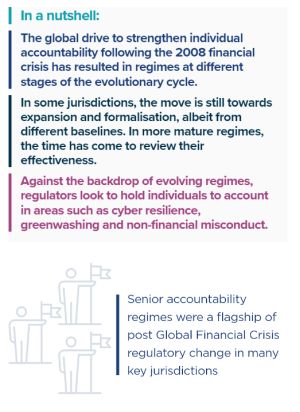Ground continues to shift under senior managers as regulators refine their approach

Senior accountability regimes were a flagship of post Global Financial Crisis regulatory change in many key jurisdictions. Where these regimes have been up and running for a period, policymakers are now looking at the effectiveness of these regimes and whether change is needed to respond to today's operating environment.
Singapore: Starting to bite
Singapore's approach to senior manager oversight has to date been less formal than other jurisdictions, with the key accountability rules set out in the MAS Guidelines on Individual Accountability and Conduct. The Guidelines focus on familiar objectives of promoting accountability, strengthening oversight of material risk personnel and reinforcing standards of proper conduct among all employees. Contravention of Guidelines is not a criminal offence and does not attract civil or administrative penalties. However, non-compliance may have an impact on MAS' overall risk assessment of that institution.
Nonetheless, we may be seeing the global trend of more robust individual accountability regimes having an impact in Singapore. MAS is increasingly taking more action against individual senior managers, particularly in the past year. An example of this increased appetite to use the current regulatory framework to pursue individuals can be seen in the Three Arrows Capital case, where MAS issued prohibition orders against both the CEO and chairman for failing to discharge their responsibilities as senior managers to ensure the financial institution's compliance with requirements under the Securities and Futures Act 2001 and the Securities and Futures (Licensing and Conduct of Business) Regulations (SFR).
"The world has changed markedly since the 2007/2008 crisis – senior managers face new challenges with the advance of AI, the ESG agenda and more.
Hannah Cassidy
Hong Kong
While there does not seem to be a move to further formalise or legislate the Guidelines, we expect that enforcement trends against senior managers (using existing legislation such as the SFR) will continue, as MAS seeks to instil better accountability culture in financial institutions.
Australia: The next frontier
The Australian regime is set to expand its scope and reach in the year ahead – with joint regulation by the conduct and prudential regulators, as well as a broader array of financial services businesses within its scope. Superannuation and insurance institutions will now join banking institutions as entities within the purview of the new Financial Accountability Regime (FAR), formerly known as the Banking Executive Accountability Regime.
With a broad Australian regulatory focus upon risks such as cyber resilience, green-washing, green-hushing and emerging digital technologies, we expect that any investigation into these issues will likely be accompanied by an enquiry into the role senior executives play in appropriately managing these risks. The focus ahead is likely to be on the need to proactively identify and mitigate these risks, including by allocating appropriate resources to these issues. Clarity of responsibilities among senior executives is an important part of the process of ensuring any business, and its senior executives, discharge the standards expected of them in the year ahead.
"Rethinking individual accountability requirements is both timely and necessary.
Ruth Overington
Melbourne
Hong Kong: Reached maturity
In Hong Kong, regulatory frameworks for senior management accountability have reached a level of maturity since regimes were introduced by the SFC and the HKMA in 2016 and 2017 respectively.
Given the heightened focus on corporate governance and senior management accountability by regulators across the globe, we will continue to see the SFC taking action using their Manager-in-Charge regime to identify regulated persons responsible for misconduct.
Holding senior managers to account is seen by the regulator as key to ensure the right culture, as evidenced by comments from the SFC's Executive Director of Enforcement in relation to a disciplinary action from 2023: "The disciplinary action....underscored the SFC's determination to hold errant senior management accountable for their firms' failures. This is imperative for driving changes in the culture and behaviour of intermediaries."
We anticipate continued scrutiny of individual conduct in regulatory enforcement, particularly in the context of cyber security, operational resilience, and internal controls.
"Individual accountability regimes have not delivered the enforcement outcomes originally promised – but they have focused senior managers' attention on risk and governance responsibilities.
Hywel Jenkins
London
UK: Competing objectives?
Originally billed as a means of piercing the so-called 'accountability firewall' protecting senior individuals, the UK's Senior Managers and Certification Regime (SMCR) has led to surprisingly few concluded outcomes given the initial fanfare. Indeed, almost all individual actions taken to date could effectively have been brought under the previous individual accountability regime, although 2023 did see the first case involving a breach of the Senior Manager Conduct rules.
More recent regulatory messaging has focused on the regime's preventative impact in improving governance and avoiding the need for enforcement in the first place.
That said, the PRA in particular is showing more enthusiasm for Senior Manager enforcement, and the number of investigations being undertaken against individuals by both UK regulators remains high. It could still therefore be the case that enforcement outcomes are concluded in the coming year. There are also increasing drivers for firms to investigate individuals, including in relation to non-financial misconduct which will remain a hot topic following the recent joint discussion paper on D&I.
In the meantime, we await the outcome of potential reform to the SMCR under the UK Government's Edinburgh Reforms. So far this has consisted of questions and a call for evidence rather than concrete proposals, but while the objectives underpinning the threat of individual accountability to drive standards remain, the UK Government is also looking at the regime's impact on the UK's international competitiveness, and its potential to act as a 'push factor' for overseas business.
2024 therefore may see some change to the SMCR just as the backlog of investigations results in more published final outcomes of which firms and their managers can take account.
The content of this article is intended to provide a general guide to the subject matter. Specialist advice should be sought about your specific circumstances.







